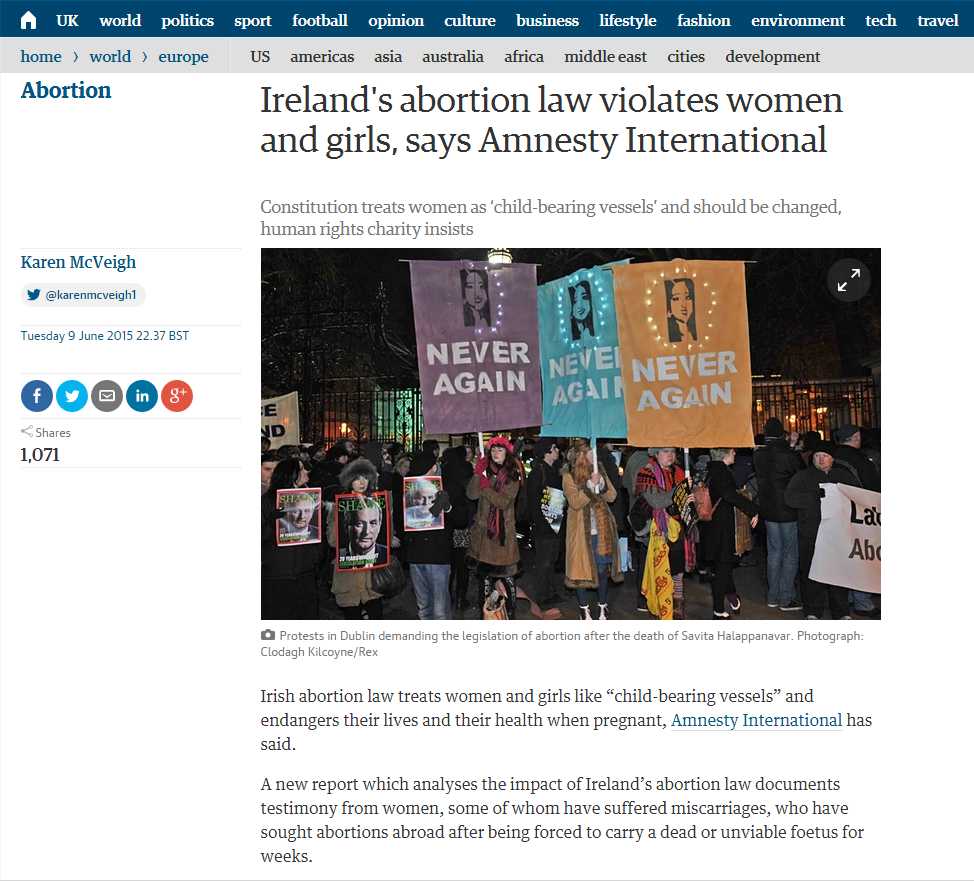Ireland's abortion law violates women and girls, says Amnesty International
Women and girls who need abortions are treated like criminals, stigmatised and forced to travel abroad
Amnesty International
Irish abortion law treats women and girls like “child-bearing vessels” and endangers their lives and their health when pregnant, Amnesty International has said.
A new report which analyses the impact of Ireland’s abortion law documents testimony from women, some of whom have suffered miscarriages, who have sought abortions abroad after being forced to carry a dead or unviable foetus for weeks.
Ireland’s abortion law, which only allows abortion if the mother’s life is at risk, is one of the most restrictive in the world. It has resulted in 4,000 women and girls travelling abroad for healthcare, the report said.
Ireland’s legal framework has been left unchanged, the report says, despite recent reforms in the aftermath of the highly publicised death of Savita Halappanavar, a 31-year-old Indian woman who was denied a medically-induced abortion in 2012 in a hospital in Galway after a miscarriage.
Instead, the ongoing lack of clarity in the law, combined with the threat of sanctions and criminal prosecution for healthcare providers, means that “pregnant women and girls in need of an abortion for medical reasons are essentially forced to wait until their condition deteriorates sufficiently in order to justify a medical intervention”.
Irish women are not allowed abortion in cases of rape, severe or fatal foetal impairment or a risk to their health; even giving them information about the procedure is a crime.
The human rights charity has called for an amendment to Ireland’s constitution to decriminalise abortion.
“The human rights of women and girls are violated on a daily basis because of a constitution that treats them like child-bearing vessels,” said Amnesty International’s secretary-general Salil Shetty.
“Women and girls who need abortions are treated like criminals, stigmatised and forced to travel abroad, taking a serious toll on their mental and physical health. The Irish state can no longer ignore this reality and the appalling impact it is having on thousands of people every year.”
The Amnesty International report, called “She is not a criminal: the impact of Ireland’s abortion law”, details the religious and social framework that has helped shape the laws which make procuring or administering an abortion a criminal act, except where there is a substantial risk to a mother’s life.
Medical experts say they cannot always predict the point or speed at which a problem can escalate into a risk to life. The result, the report found, is “a situation where healthcare providers have withheld medically indicated treatment, including abortion”.
It found cases where providers “waited for a pregnant woman’s health to seriously deteriorate”, “refrained from providing a suicidal woman with critical mental healthcare”, forced medical care on a woman without her consent and kept a clinically dead pregnant woman on life support, denying her the right to die with dignity.
In 2012, there were protests over Ireland’s abortion laws after the death of Halappanavar. The Health Information and Quality Authority ruled in 2013 that her death was preventable and identified 13 missed opportunities to intervene.
The Protection of Life During Pregnancy Act was introduced, intended to clarify the law by allowing terminations where there is a threat to the life of the mother or when doctors agree the expectant mother may take her own life over her pregnancy.
But, the Amnesty report notes, the Eight Amendment which protects the life of the foetus still stands.
“For a doctor to say ‘you are not dying enough yet,’ like Savita Halappanavar was not dying enough, until she was and they couldn’t pull her back from the brink because the infection had ravaged her body – it is barbaric,” Alison Begas, chief executive of Dublin Well Woman, told Amnesty.
Dr Peter Boylan, an obstetrician, gynaecologist and former master and clinical director of Ireland’s National Maternity Hospital said the law had created legal and ethical dilemmas for medical staff: “Under the [current law], we must wait until women become sick enough before we can intervene. How close to death do you have to be? There is no answer to that.”
One woman who was carrying a foetus that had no heartbeat for 14 weeks told Amnesty International that she had to travel to her home country of Spain for medical treatment. “I didn’t feel safe at all,” she said. “I was really scared. It became clear that if any complication was raised, these people would let me die.”
The Amnesty International report said: “Ireland must amend the constitution and remove the protection of the fetus.”
http://www.theguardian.com/world/2015/jun/09/irelands-abortion-law-violates-women-and-girls-says-amnesty-international
